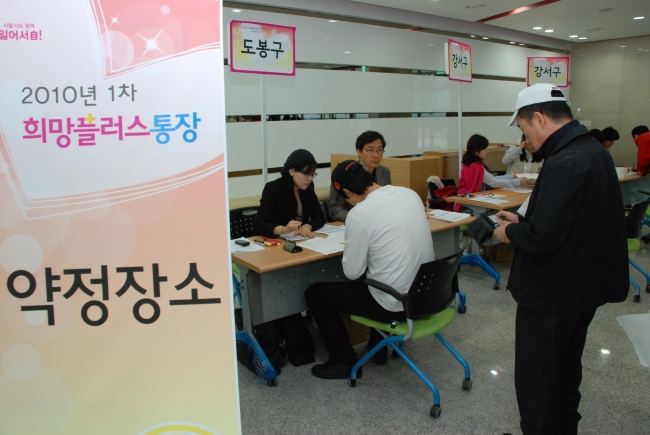A 55-year-old surnamed Choi, who lives in Jinan-gun, North Jeolla Province, depends on state welfare benefits to makes ends meet.
In 2010, he was given the chance to secure some extra money through a government-led program called Hope Building Accounts.
Under the program, he saved 100,000 won ($97) in a special bank account every month. The government adds to this amount, so that the final sum he would get at the end of the three-year program would be 20 million won.
But there is a catch: Those who receive this lump sum forfeit their right to claim benefits.
Choi dropped out of the program late last year.
“Once the account matures, my family would not qualify for government welfare benefits. I chose the benefits rather than 20 million won,” he said.
Choi’s case illustrates the problems with the ambitious program, initially designed to encourage financially strapped welfare recipients to end their reliance on welfare with the “seed money” paid at the end.
The Korean government, faced with a snowballing welfare budget, wants to reduce the number of welfare recipients by introducing incentives such as the lump sum in the HBA, but the program actually discouraged some Koreans from moving out of poverty for fear of losing their benefits.
 |
Applicants consult with counselors about asset building programs. (Seoul Welfare Foundation) |
“Even if the benefit recipients successfully accumulated more than 20 million won through the program, losing their eligibility for benefits might pose a great challenge and financial burden,” said Kim Hye-youn, professor of social welfare at Kyung Hee Cyber University. “Having some seed money may not necessarily mean that they are ready to live without benefits.”
According to a survey conducted by the Korea Institute for Health and Social Affairs in 2010, 60 percent of HBA participants initially hesitated to join the program because it would disqualify them from welfare benefits. About 25 percent said that they had worries about their financial status after they completed the program.
The Health and Welfare Ministry led the HBA program to encourage more welfare recipients to wean themselves off welfare and gain some financial security.
In addition to the account holder’s own savings, the Welfare Ministry offered extra financial incentives plus interest so that a family of three could get as much as 24 million won through the three-year program, a sum that the ministry hopes will provide the turning point for welfare recipients.
To narrow the target, the ministry set the qualification for the HBA program to those who earn 60-100 percent of the government-assessed poverty line.
For policymakers, the condition of forfeiting welfare benefits in return for the generous lump sum seems reasonable.
“The purpose of the program is to help welfare recipients to strengthen their financial status by giving them seed money. Therefore, it is natural that they are disqualified from welfare benefits,” said a ministry official.
To alleviate the burden of shifting to no-benefit status, the ministry offered a grace period in which recipients get the same benefits for the first two years after they complete the program, the official added.
More than 30,000 households have participated in the program so far. Of those who signed up in 2010, about 60 percent, or 6,400 households, successfully completed the program, while more than 30 percent dropped out of the program to keep their entitlements to welfare benefits.
Experts said the ministry’s program is relatively successful, compared with other support programs.
“Many previous programs showed only a 10 percent success rate. Compared to those, the account program is successful,” said Han Chang-keun, professor of social welfare at Sungkyunkwan University.
“For the welfare benefit issue, however, it will pose a long-term problem for the government as it has to deal with those who already completed the program but return to seek welfare benefits.”
The Seoul Metropolitan Government is running a similar program but applying a different approach. Launched in 2009, the Hope Plus Accounts program, in which the city government matches the amount saved, does not require recipients to forfeit welfare benefits once their accounts mature. It also covers not only welfare recipients but also those who have an income slightly above the poverty line.
“(The city’s) goal is to help those who generally have financial difficulties achieve financial stability. Given the program’s original purpose, participants should be barred from welfare benefits after completing the program, but considering reality, more discussion is needed,” a city official said.
As of March, some 13,000 households have completed the Seoul government’s account program and the completion rate remains at about 90 percent.
By Lee Hyun-jeong (
rene@heraldcorp.com)






![[Herald Interview] 'Trump will use tariffs as first line of defense for American manufacturing'](http://res.heraldm.com/phpwas/restmb_idxmake.php?idx=644&simg=/content/image/2024/11/26/20241126050017_0.jpg)
![[Exclusive] Hyundai Mobis eyes closer ties with BYD](http://res.heraldm.com/phpwas/restmb_idxmake.php?idx=644&simg=/content/image/2024/11/25/20241125050044_0.jpg)
